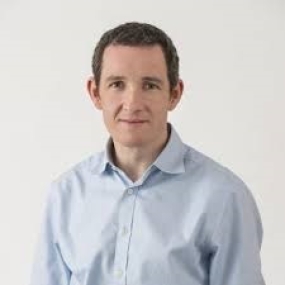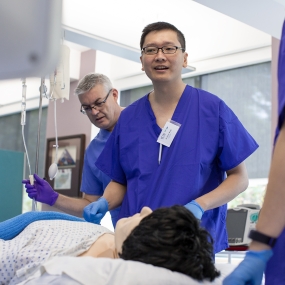SNAP2 (EpiCCS)
SNAP2 (EpiCCS)
The 2nd Sprint National Anaesthesia Project: Epidemiology of Critical Care provision after Surgery (SNAP2 EpiCCS) was managed by the NIAA Health Services Research Centre in conjunction with the UCL/UCLH Surgical Outcomes Research Centre (SOuRCe).
SNAP2 (EpiCCS) described the epidemiology of perioperative risk and outcome, and critical care referral and admission after inpatient surgery in the UK. It also aimed to examine whether planned postoperative critical care admission is effective as an intervention to reduce postoperative morbidity.

SNAP2 was generously supported by the Association of Anaesthetists of Great Britain and Ireland (AAGBI) and the Royal College of Anaesthetists (RCoA).
SNAP2 (EpiCCS): Project Outline
SNAP2 (EpiCCS) was the second Sprint National Anaesthesia Project, managed by the National Institute of Academic Anaesthesia Health Services Research Centre (NIAA HSRC) in conjunction with the UCL/UCLH Surgical Outcomes Research Centre (SOuRCe).
SNAP2 (EpiCCS) looked to describe the epidemiology of perioperative risk and outcome, and critical care referral and admission after inpatient surgery in the UK. A secondary aim was to estimate the clinical effectiveness of planned postoperative critical care admission as an intervention to reduce postoperative morbidity.
SNAP2 (EpiCCS) aimed to provide a 'snapshot' of clinical activity in hospitals throughout the UK over a one week period in 2017.
Surgical morbidity and mortality is a well-described public health issue. An estimated 313 million operations take place world-wide each year. Morbidity or complications after surgery occur up to ten times more frequently than short-term mortality and are associated with reduced long-term survival, even after accounting for known preoperative patient-related risk factors. Planned postoperative critical care admission is recommended for the "high risk surgical patient"; cohort studies reveal that despite this, the majority of patients undergoing non-cardiac, non-neurological surgery who die before hospital discharge do not have planned critical care admission after surgery.
SNAP2 (EpiCCS) explored the referral patterns and resource limitations which may be responsible for patients not being admitted to critical care, despite being high risk according to national guidelines. In particular, we explored the areas of quality and accuracy of risk stratification, critical care bed capacity, and clinical uncertainty that critical care admission would be of benefit.
EpiCCS was a prospective observational cohort study with two principle components:
- Main EpiCCS patient study
All patients undergoing inpatient surgery (elective or emergency) during the study week were enrolled onto the main EpiCCS study. - Clinicians sub-study
All anaesthetists and surgeons who undertook perioperative care for inpatient surgery during the study period were invited to participate. If they declined, they were asked to provide the reason why. If they agreed and completed the questionnaire, this was taken as evidence of implied consent.
Additionally, an organisational questionnaire for each hospital was completed to describe structure and process in those institutions, and critical care unit occupancy at regular time-intervals throughout the one-week data collection period.
The two part nature of SNAP2 (EpiCCS) study required two types of participant, with differing approaches to consent for each type:
- Main EpiCCS patient study: Section 251 exemption
To be able to collect patient data without consent, we were granted a Section 251 exemption. The reason for a non-consenting approach was an attempt to avoid sampling bias. It is likely that patients who are of higher perioperative risk would be unable or unwilling to provide consent - we have data from SNAP1 to support this assertion. - Clinicians' perceptions sub-study: implied consent approach
We proposed an implied consent approach, with completion of the questionnaire as evidence of consent. Every perioperative anaesthetist and surgeon during the study week was asked to complete a questionnaire which explored their approach to risk stratification and postoperative care. Given that there are national guidelines regarding these questions, we were keen to provide reassurance to perioperative anaesthetists and surgeons that their responses would be used in confidence, without risk of litigation or reprisal. If anaesthetists or surgeons chose not to answer the questionnaire, then they were asked to provide a reason why, for the purposes of analysis.
Adult ( >=18 years ) patients undergoing surgery or other interventions who were expected to require overnight stay in hospital which required the support of an anaesthetist. These included all procedures taking place in an operating theatre, radiology suite, endoscopy suite or catheter laboratory for which inpatient (overnight) stay was planned, including both planned and emergency/urgent surgery of all types, Caesarean section, surgery for complications of childbirth, endoscopy and interventional radiology.
Patients who indicated they did not want to participate in the study; Ambulatory surgery; children (<18 years); non-surgical obstetrics; ASA-PS grade VI; non-interventional diagnostic imaging (e.g. CT or MRI scanning without interventions); emergency department or critical care interventions requiring anaesthesia or sedation but no interventional procedure.
- To collect data on all patients undergoing inpatient surgery for one week in UK NHS hospitals.
- To measure and analyse patient-level estimates of perioperative risk using previously validated risk prediction tools to determine their accuracy (discrimination and calibration) in a comprehensive national sample.
- To use three different analytic techniques (regression, instrumental variable and propensity score matched analyses) to measure the relationship between patient risk factors, postoperative critical care admission and patient outcomes (morbidity, mortality, and quality of recovery).
- To survey anaesthetists and surgeons on their attitudes and behaviours regarding risk prediction and postoperative critical care admission.
Please click here for SNAP2 Study Documents, including the protocol, ethics information, and help sheets.
SNAP2 Publications
Journal Publications
Cancellations
This is an analysis of cancellations data. Well done to all the collaborators up and down the UK for your hard work. This was a huge study in 245 NHS hospitals & 14,796 patients included in this analysis!
Organisational Survey
In this paper we discuss the availability of critical care beds for postoperative patients, and provide the latest estimates for postoperative critical care bed numbers in the UK, Australia and New Zealand.
Clinicians' Perceptions
Hashem et al - 2021 - Perceptions of UK clinicians towards postoperative critical care
Developing and validating subjective and objective risk-assessment measures for predicting mortality after major surgery: An international prospective cohort study
Other Publications
Protocol
Man vs machine: how good are clinicians at predicting perioperative risk?
Wong et al. - 2018 - Man vs machine: How good are clinicians at predicting risk?
Are you a patient looking for information on SNAP2?
Meet the SNAP2 (EpiCCS) team

MD(Res) MRCP FRCA FFICM
Ramani is a Consultant and Honorary Senior Lecturer in Anaesthesia and Intensive Care Medicine at University College London Hospitals (UCLH) and Director, UCL/UCLH Surgical Outcomes Research Centre. She is a Board Member of the UK's National Institute for Academic Anaesthesia (NIAA), where she is Academic training advisor and is Deputy Director of the NIAA's Health Services Research Centre. She is Academic Training Program Director for the London Academy of Anaesthesia. She was a Council Member of the Royal College of Anaesthetists between 2008 and 2012.
Ramani's research interest is Health Services Research and Improvement Science in perioperative medicine, in particular, risk stratification and outcome measurement with a view to improving the quality of care for patients undergoing major surgery. She has recently begun a 3-year post-doctoral fellowship in Improvement Science with the Health Foundation and is leading the development of a Perioperative Quality Improvement Programme to measure morbidity and patient reported outcome after major non-cardiac surgery.

PhD FRCA FFICM
Steve is a Consultant in Anaesthesia and Critical Care at University College Hospital London. For half the week, he works on the Critical Care Unit and in theatre, and for the other half, he works in a research group that tackles clinical research questions using electronic health records.
For his PhD he designed and conducted a two-arm prospective observational cohort study in 96 acute NHS hospitals in England, Wales and Northern Ireland, in order to examine the survival of deteriorating ward patients, and estimate the effect of early delivery of critical care on outcomes.

Danny is an Anaesthetic Specialty Registrar from London, currently taking time Out-of-Programme for Research (OOPR) with the National Institute of Academic Anaesthesia Health Services Research Centre (NIAA HSRC). He is the trainee lead for SNAP2: EpiCCS and is registered for an MPhil/PhD at the Department of Applied Health Research (DAHR), UCL.
We thank the members of the SNAP2 Steering Panel for their hard work and wise advice throughout this project:
- Prof Mike Grocott, Steering Panel Chair
- Dr Shafi Ahmed
- Dr Stephen Brett
- Dr Anna Batchelor
- Dr Mizan Khondoker
- Dr Mike Nathanson
- Ms Catherine Plowright
- Mr Suman Shrestha
- Mr Richard Shawyer
- Prof Robert Sneyd
